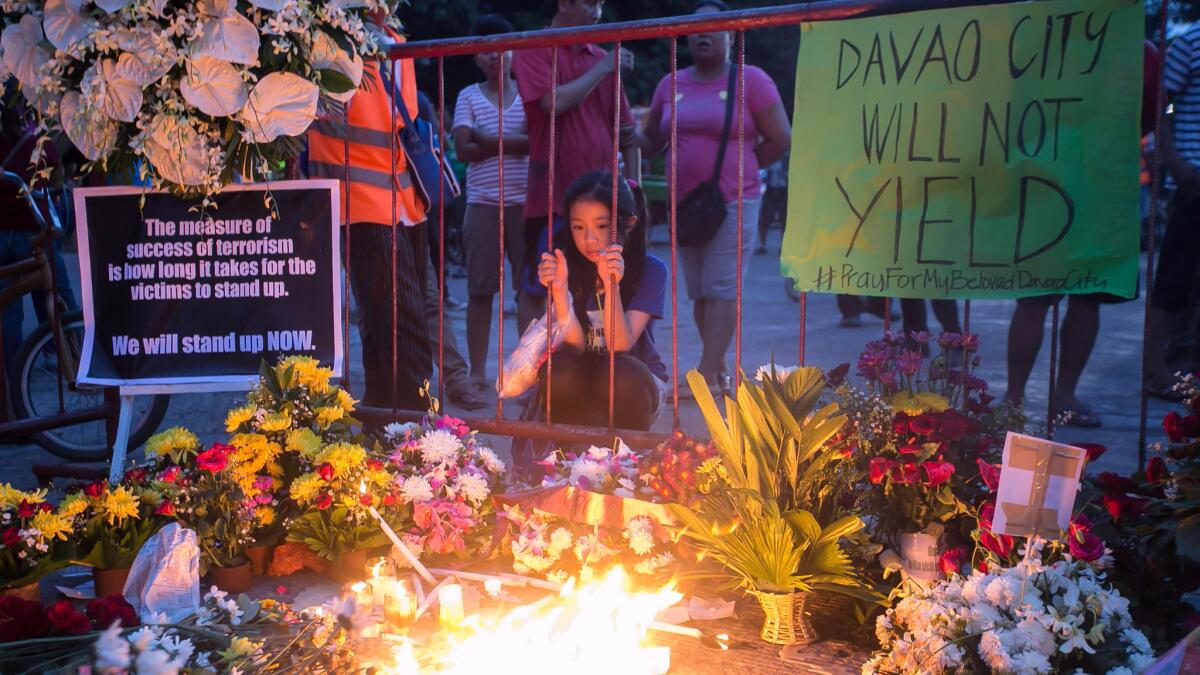Philippine leader declares ‘state of lawlessness’ after deadly market bombing

Reporting from BEIJING — Philippine President Rodrigo Duterte on Saturday declared a nationwide “state of lawlessness,” granting the military special powers to aid in police operations after an attack in the country’s southern region killed 14 people.
At least 71 people were injured in the explosion Friday night at a market in Davao, a city Duterte led as mayor for 22 years before he assumed the presidency. National Defense Secretary Delfin Lorenzana blamed the Philippines Islamist extremist group Abu Sayyaf for the attack; a presidential spokesman said that parts of an improvised explosive device were found at the scene.
The declaration permits the police and military to set up checkpoints and patrols, and to search cars and pedestrians.
“It’s not martial law, but it would require nationwide, well-coordinated efforts of the military and the police,” Duterte said, according to the Philippine Daily Inquirer newspaper.
Analysts said that Duterte’s declaration also could abet his brutal — and intensifying — “war on drugs,” which has killed nearly 2,000 suspected drug users and pushers since he took office June 30. Duterte promised that 100,000 drug dealers would be killed in his first six months in office; since then, the country has seen an increase in both police shootings and summary executions by shadowy vigilantes.
“We’re trying to cope with a crisis now. There is a crisis in this country involving drugs, extrajudicial killings, and there seems to be an environment of lawless violence,” Duterte told reporters at the scene of Friday’s attack, according to the Associated Press.
Jose Torres, a Manila-based journalist and author, described the president’s declaration as a “double-edged sword.”
“With the state of lawlessness, he has declared everything to be under the police and the military,” said Torres, who wrote “Into the Mountain: Hostaged by the Abu Sayyaf.”
“He can be tougher and crack down on lawless elements. But at the same time, anything that can happen under the state of lawlessness can be blamed on him. He can no longer blame vigilante groups, or drug syndicates killing people from other syndicates.”
Some Philippine politicians have called on Duterte to exercise caution.
“I condemn in the strongest terms the dastardly act of killing and wounding innocent civilians, but I see it as an isolated incident,” acting Senate President Franklin Drilon said in a statement quoted by the Philippine Daily Inquirer.
“I defer to the judgment of the president who has access to intelligence information,” Drilon continued, but he urged Duterte to be prudent about making such declarations “because of its effect on our economy, investment and business climate, especially our tourism.”
Abu Sayyaf is one of three major separatist groups in the southern Philippine island of Mindanao, an impoverished, majority-Muslim region that long has chafed at Manila’s rule. (More than 80% of Filipinos are Roman Catholic.)
Philippine armed forces ramped up an offensive against the group on the southern island of Jolo in late August, after it beheaded a village chief.
The group’s spokesman, Abu Rami, took credit for Friday’s attack, saying it was a “call for unity to all mujahideen in the country,” according to the Philippines’ ABS-CBN News. He warned of more attacks in coming days.
Abu Sayyaf and some smaller militant groups have pledged allegiance to Islamic State. They wave Islamic State flags, echo Islamic State ideology and, like the extremist group, produce gruesome, Internet-ready videos of their victims. Experts say that there is no evidence, however, that Islamic State is actively supporting Abu Sayyaf.
The group beheaded two Canadians this year after demands for millions of dollars in ransom were not met. The incidents reverberated around the world, drawing an international spotlight to the region and its capacity for violence.
“Whoever was behind [Friday’s bombing] was actually tempting Duterte, or courting him, because he’s been so tough,” Torres said.
“They could have done it in another place, but they did it in Davao because that’s where he was from, and where he said it was very safe.”
ALSO
Obama makes progress on climate change, the bright spot in his China policy
13 killed, dozens wounded as suicide bombers target a Christian colony and a courthouse in Pakistan
U.S. and China ratify sweeping climate deal and urge other nations to follow their lead
More to Read
Sign up for Essential California
The most important California stories and recommendations in your inbox every morning.
You may occasionally receive promotional content from the Los Angeles Times.









